The Best ERP for Professional Services
Implementing enterprise resource planning (ERP) software for your business can be intimidating, even when you know exactly which tool is right for you.
So, what do you do when you’re starting at square zero?
In this article, we’ll set your ERP implementation up for success by giving you tips and tricks to successfully identify the best professional services software for your business. Then, you can continue on to our list of the best ERP for professional services on the market.
Challenges of Implementing ERP for Professional Services
There are two main challenges you have to face when considering an ERP software implementation. The first challenge is making sure that your entire team is aligned on the benefits an ERP tool can bring.
The importance of this cannot be overstated, as it has been found that one of the main reasons for ERP implementation failure is resistance to change (Deloitte). If some team members are hesitant to invest their time and energy into this process, it’ll make it that much harder, and ultimately likelier to fail.
You can assuage some worries with tried-and-tested statistics: for example, research by Mint Jutras has shown that 82% of participants who have set ROI goals during their ERP implementation have successfully met them. Furthermore, only 2% of participants reported being unsuccessful in their overall ERP implementation.
Of course, this doesn’t mean that you will achieve great results without doing your due diligence first. The second challenge is to choose the right professional service management software among all the options available on the market. You’ll need to consider the following factors to make the best choice:
- Your industry
- Your business needs
- The availability of continuous support
Choosing the Best ERP for Professional Services
ERP software can greatly benefit your company, whether you provide marketing, IT, healthcare, legal, architectural, or any other services. While most products are multi-purpose, some tools might be a better fit for specific services, depending on their features or the context in which they were developed (for example, you can check out our specialized list of the best architecture project management software).
You might also consider professional services automation software, which is specifically tailored to improve the business processes of professional services businesses.
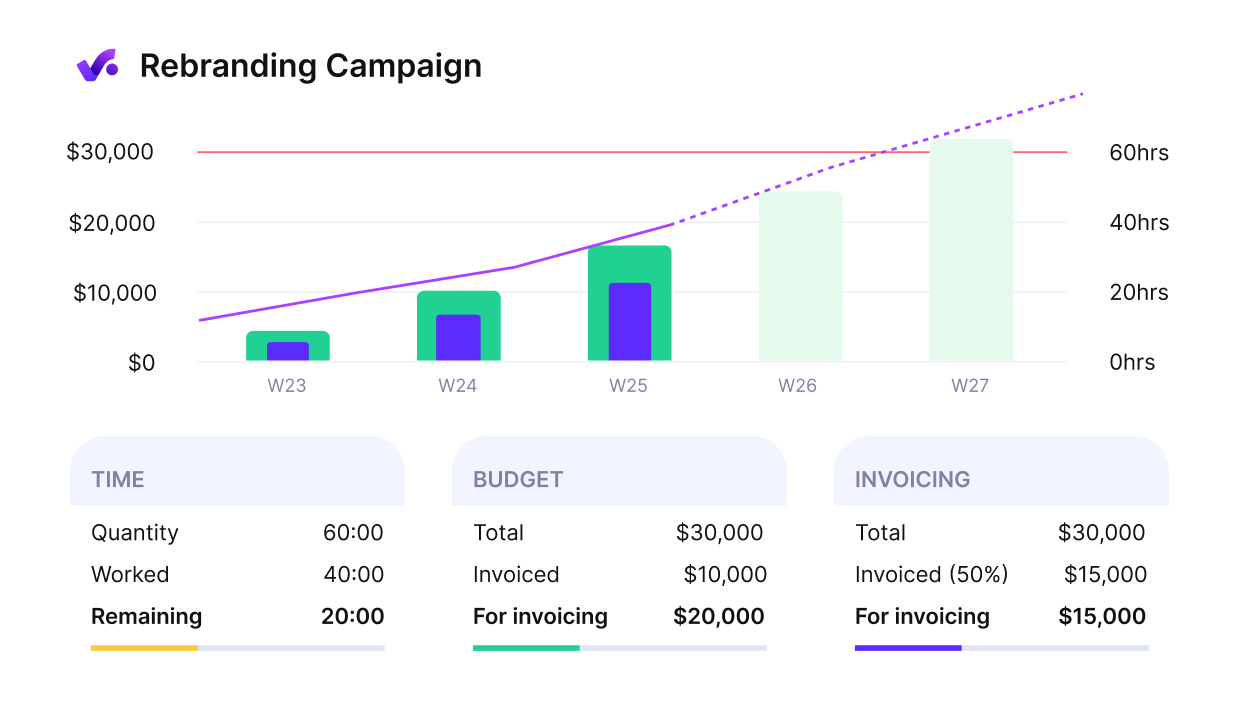
AGENCY SOFTWARE LIKE PRODUCTIVE CAN SUPPORT KEY FINANCIAL INSIGHTS
When choosing enterprise resource management software, consider your pain points. Are you lacking proper financial insights, having trouble managing your team’s workload, or seeing gaps in your customer relationships? Or perhaps all of the above?
Make sure that your professional services organization ERP addresses your main challenges such as tracking time. That being said, the best tools on our list can cover all your organizational needs, even those you might not realize you have.
Try Productive’s agency ERP software
Implementing ERP Software
Finally, implementing ERP software isn’t a one-and-done process. Ensuring your team knows how to get the most out of your professional services automation tool is another hurdle your organization needs to overcome. This is why it’s a good idea to choose intuitive and user-friendly products.
Additionally, it’s good to ensure that your chosen provider offers good customer service. As intuitive as the product might be, you will need professional assistance sooner or later. It’s best that this experience is efficient and pleasant. For all of the above, unbiased customer reviews, such as those from G2, Capterra, or Gartner, can support your decision-making process.
I think the things that were most impressive were Productive understanding what our needs were, really deeply understanding our business and what we wanted. That was incredibly comforting, to know that someone was taking notice. The onboarding sessions were relevant, designed for us and extremely well prepared.
See how the worldwide company Akcelo efficiently onboarded its team to Productive.
Our List of the Top 17 ERP Solutions for Agencies
Let’s dive into our top examples of enterprise resource planning (ERP) systems:
1. Productive – Best All-in-one ERP for Professional Services
Productive is a comprehensive professional services management software solution that integrates all of the key features you need to reach your business objectives. From project management, resource allocation, client management, and project billing, Productive is a single source of truth for your business operations.
Having tried multiple tools over the years we eventually found Productive, and it is fair to say that it has transformed our organization. We are in total control of our projects – no more surprises.
Source: Capterra
Let’s dive deeper into what Productive can do for you.
Key Features Include:
Project Planning
Simplify all your time-consuming tasks with Productive’s simple, yet effective project management system. Get all-around insights into your project and optimize your team collaboration with flexible project views and easy-to-set-up task dependencies. You can also invite your clients to your projects to provide them with real-time updates. Use permissions to modify which parts of your process your clients can view and access.
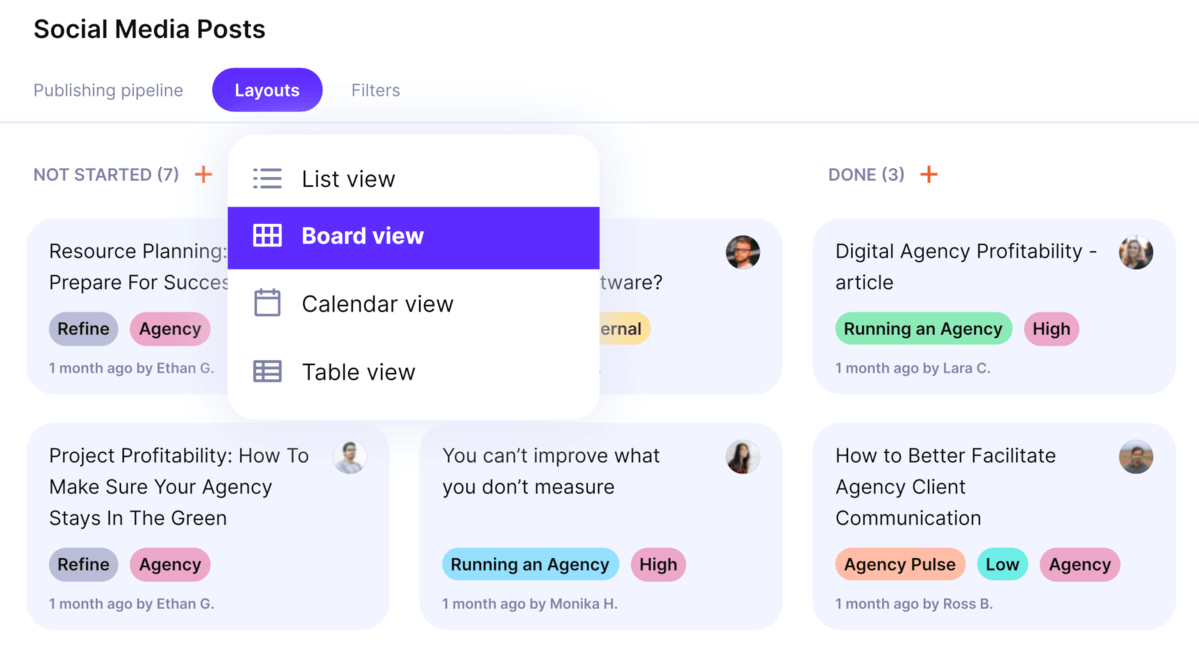
KEEP TRACK OF YOUR PROJECT PROGRESS WITH CUSTOMIZABLE DASHBOARD VIEWS
Task management has an integrated time tracking feature, so you can seamlessly connect your project insights with human capital management. This powers up advanced analytics that support your team operations, from checking team member workload to managing vacation and off-days.
Financial Reports
With Productive, your company’s financials are at your fingertips. Empower your business by making informed decisions backed up by real data. Set up your budgets with Productive’s flexible budgeting system, whether your project type is fixed-price, hourly, or mixed.
If you’re running a complex project, segment your budget into separate phases for simplified expense tracking. You can also get real-time business insights into future profit margins with customizable project reports.
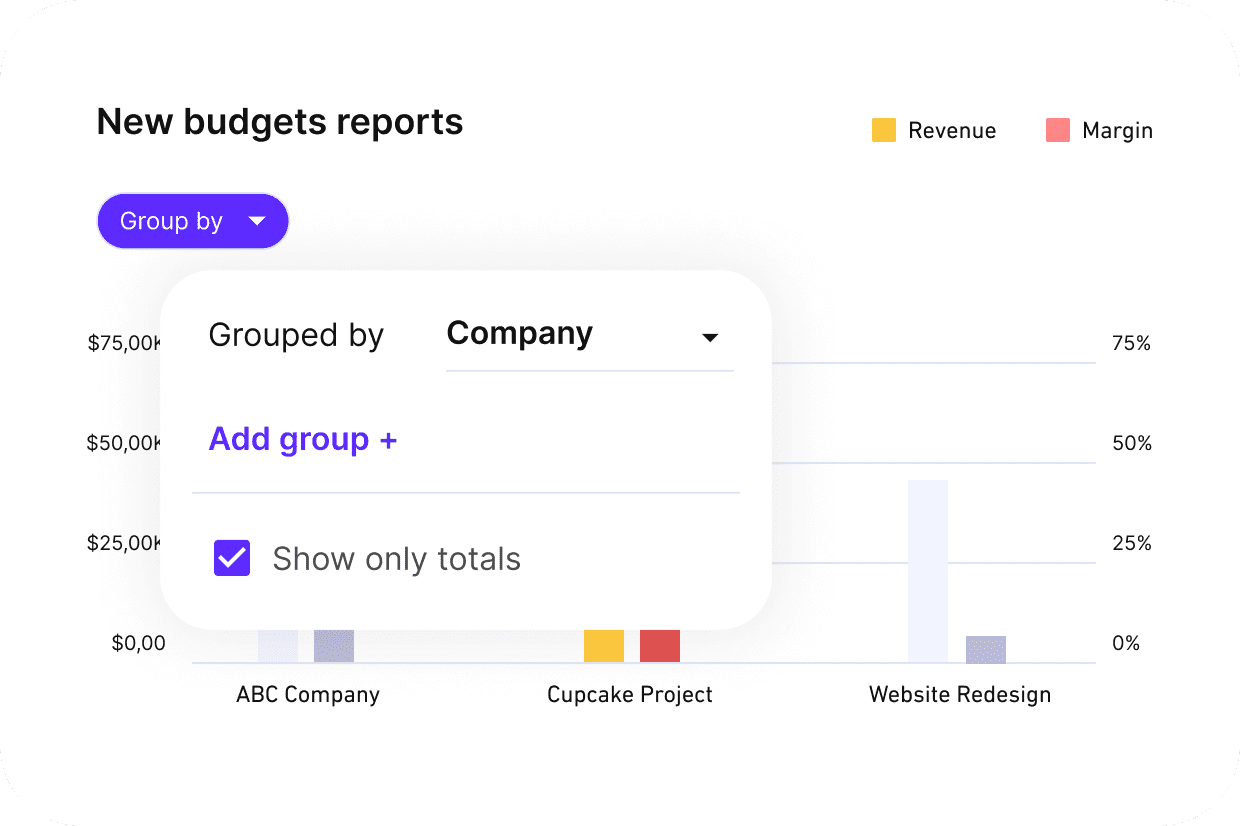
CREATING BUDGETS IN PRODUCTIVE FUELS INSIGHTFUL REAL-TIME ANALYTICS
Resource Management Tools
Productive also has extensive resource management capabilities that are linked with reporting. You can view profitability by employee and team, and forecast your utilization by managing billable and non-billable work. Schedule your team’s work in advance and create placeholders to account for new hires. With Productive, no scenario will be left unaccounted for.
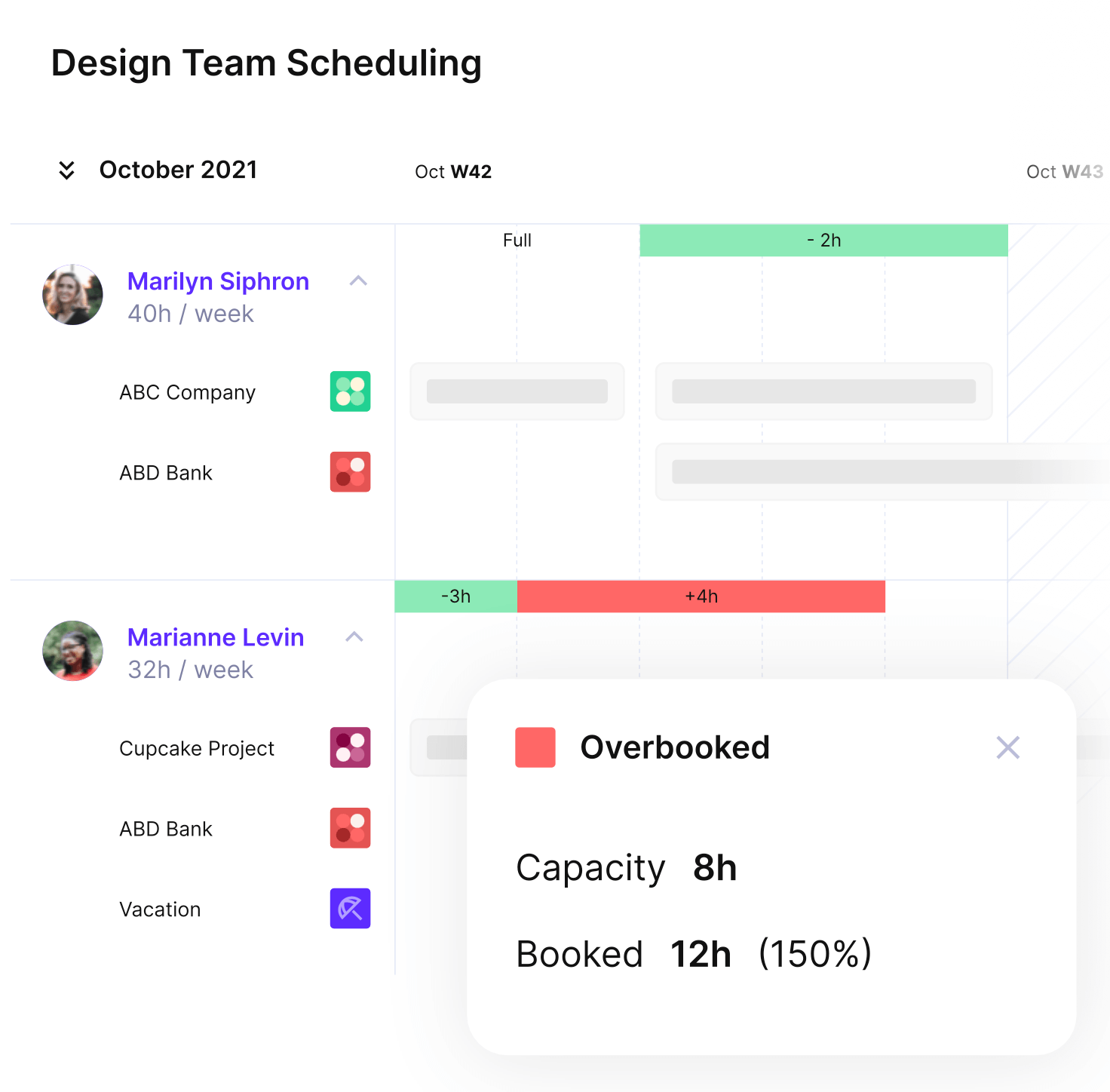
PRODUCTIVE ENABLES HIGH-LEVEL PLANNING WITH INTEGRATED WORKLOAD AND LEAVE MANAGEMENT
A Comprehensive Software Solution
Productive is the single solution for all your administrative tasks. Benefit from its integrated sales funnel: keep track of your leads in one place and forecast potential sales revenue. Send service rate quotes directly from Productive and effortlessly turn won leads into projects. No data on Productive is wasted.
Productive gathers additional key features, such as real-time collaboration with Docs. Create tasks on Productive straight from your documents and gather all your documentation on one platform.
If you want to keep using certain tools along with your comprehensive ERP for professional services providers, Productive offers integrations with management and communications apps such as Google Calendar, Jira, Slack, and QuickBooks.
Pricing
- Plans start with the Essential plan at $10 per user per month, which includes essential features such as budgeting, project & task management, docs, time tracking, expense management, reporting, and time off management.
- The Professional plan includes custom fields, recurring budgets, advanced reports, billable time approvals, and much more for $25 per user per month.
- The Ultimate plan has everything that the Essential plan and Professional plan offer, along with the HubSpot integration, advanced forecasting, advanced custom fields, overhead calculations, and more. Book a demo or reach out to our team for the monthly price per user.
Productive has a free 14-day free trial, so you can try out what the tool can offer to your professional services firm.
Manage Your Business Operations
Invest in an all-in-one agency management solution that supports both administrative and high-level tasks.
2. NetSuite – An ERP for Service Industry for Expert Teams
Netsuite is an ERP tool for professional services companies that automates manual processes and helps provide visibility into financials and overall business performance. With features such as order processing, inventory management, and supply chain and warehouse operations, Netsuite supports businesses that run product-based projects.
Key Features:
- Financial management and invoicing
- Time tracking and expense management
- Real-time analytics and reporting

SOURCE: NETSUITE
While users on Capterra often praise Netsuite’s robust management functionalities, frequently highlighted downsides are difficulty in implementation due to a complex interface that requires extensive support to get used to. Companies that are not ready to invest the necessary energy and manpower to use Netsuite to its maximum potential might consider Netsuite alternatives with equally comprehensive features.
3. Sage Intacct – An ERP Software Tool for Financial Performance
Sage Intacct is a professional services ERP software solution that specializes in streamlining financial operations. Sage Intacct provides businesses with accurate accounting that ensures compliance with accounting standards through billing, invoicing, and procurement solutions.
Key Features:
- Advanced project billing feature
- Cash visibility and cash flow management
- Detailed financial reporting and analytics
- Multi-entity and multi-currency support
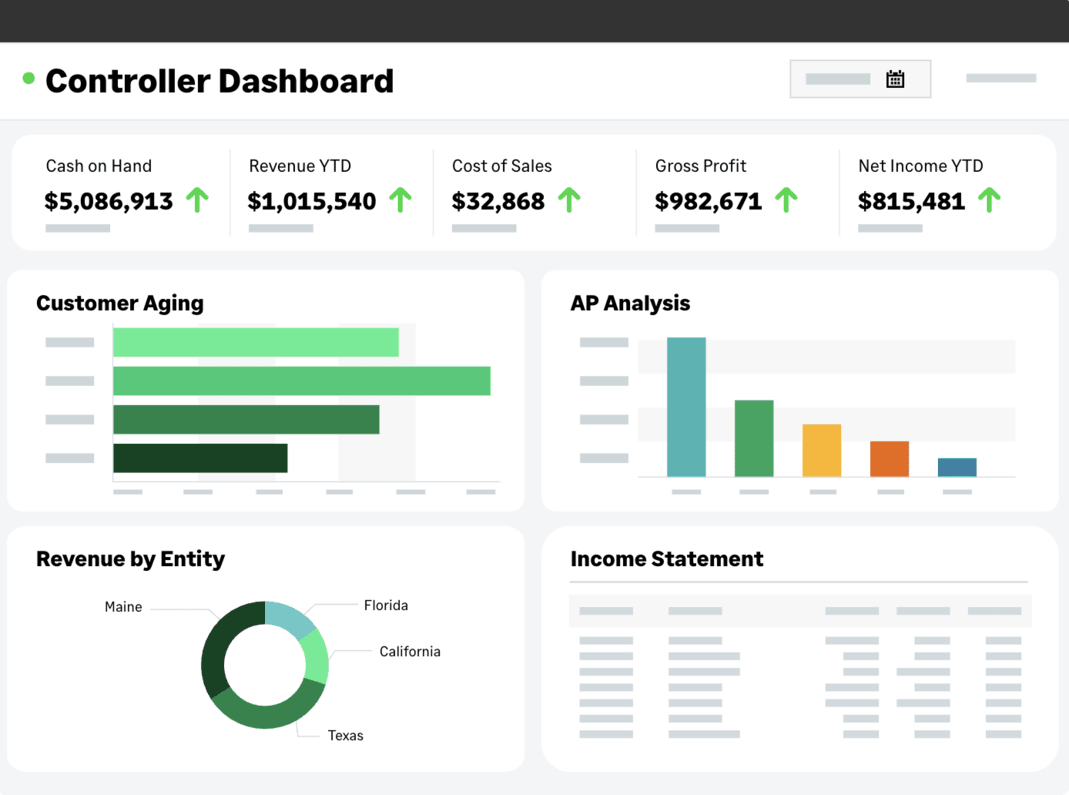
SOURCE: SAGE INTACCT
As Sage Intacct’s main downside, users report that the plain, simplistic design of the pages can sometimes increase fatigue, thus decreasing productivity and creativity. However, users are still mainly positive about Sage Intacct’s utility for financial services. In conclusion, Sage Intacct is a good choice for companies looking for a highly specialized solution. However, professional services teams that have a preference for more visual tools or all-in-one management solutions might want to consider other options.
4. Sage – A Good Overall ERP Software Option
Along with Sage Intacct, Sage ERP is a suite of software solutions for service companies from Sage Group, the provider of leading solutions in the ERP space. While Sage Intacct focuses on cost management and financial services, other Sage products such as Sage 100, Sage 300, or Sage X3 are suitable for more generalized business management.
Key Features:
- Financial management and project accounting
- Production management and resource management
- Time tracking and billing capabilities

SOURCE: SAGE
While the biggest benefit of Sage is that the products are built with specific industries in mind, users frequently note that they feel “a little outdated” and “not as modern” as comparable tools (Source: G2). Other users have also noted that Sage’s project systems are not as flexible or customizable as they might expect.
5. Teamwork – A Management System for Project-Based Services
Teamwork is a comprehensive project management and collaboration platform that is suitable for any project-based professional services company. Teamwork is often praised by users for its user-friendly interface and visual design.
Key Features:
- Project planning and task tracking
- Resource scheduling and team management
- Document sharing and collaboration
- Integrations with popular productivity tools

SOURCE: TEAMWORK
As an end-to-end project management tool, Teamwork does a lot of things well. However, it does lack some enhanced reporting capabilities, especially when it comes to revenue calculations in the form of financial forecasting and budget spending warnings.
Additionally, in comparison to some Teamwork alternative options, it’s let down by the fact that features such as custom reports, shared dashboards, and project budgets are limited depending on your pricing plan.
6. Smartsheet – A Collaborative Tool for Professional Services Providers
Smartsheet is a type of collaborative, content-based software for services companies. Smartsheet provides teams with real-time data and standardized processes for successful project planning and execution.
Key Features:
- Customizable project templates and workflows
- Resource allocation and revenue calculations
- Gantt charts and project timelines
- Data visualization and analytics

SOURCE: SMARTSHEET
Even though users frequently praise Smartsheet for its user-friendly interface that allows for quick team adoption, there are some notable downsides. Users mainly mention that the resource management feature could be more robust, as there are some missing functionalities, such as the ability to forecast hours. Additionally, some users have noted that more advanced features are significantly harder to use, so it might take a dedicated team to get the most out of Smartsheet.
7. SAP – A Professional Service Suite with Diverse Options
SAP is a provider of professional services ERP software, with a suite of products that support service performance insights. SAP provides the SAP S/4HANA Cloud tool for enterprise-level clients, and the simpler SAP Business One and SAP Business ByDesign tools for smaller to midsized companies.
Key Features:
- Robust financial management and reporting
- Real-time analytics and data visualization
- Integration with SAP’s ecosystem of solutions

SOURCE: SAP
Although SAP provides an impressive offering of tools ranging from financial management, human capital management, CRM management, and supply management, the sheer extent of the available resources might be overwhelming to new users. Investing in an all-in-one solution is a more time and cost-effective option, especially for businesses that do not have the extra manpower to dedicate to full-time software implementation.
8. Microsoft Dynamics 365 – A Suite of ERP Solutions for Consulting Firms
Microsoft Dynamics 365 is an ERP platform that integrates solutions across various types of businesses and target services, including sales and marketing, customer service, finance, and supply chain.
Key Features:
- Seamless integration with Microsoft Office 365 and other Microsoft products
- Project planning and resource management
- Sales and CRM capabilities
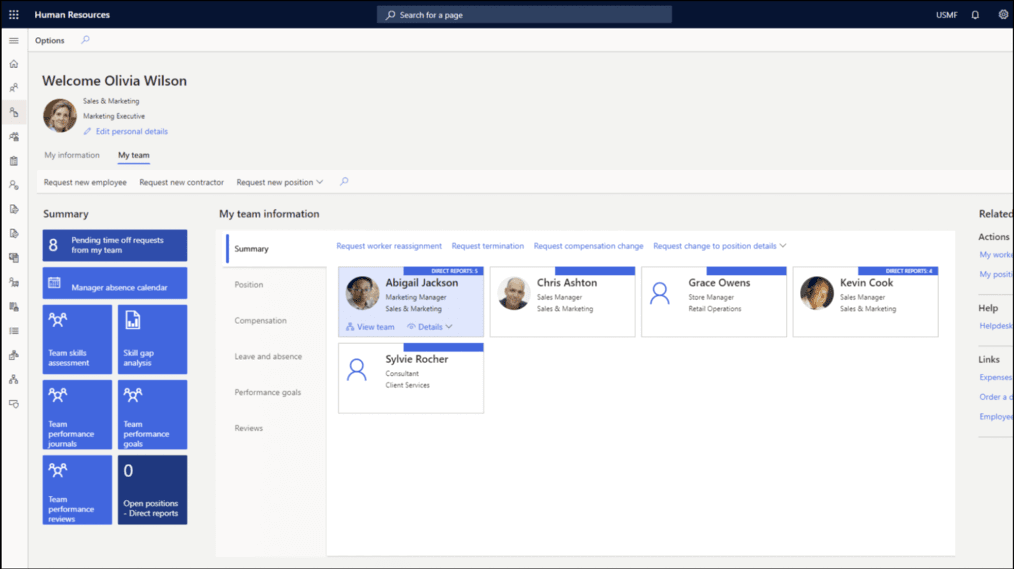
SOURCE: MICROSOFT DYNAMICS 365
Similarly to SAP, Microsoft Dynamics 365’s strengths double as its weakness. Although it offers a suite of truly robust services, customizing all of the separate tools to fit your specific needs might require a significant investment of time and money. Additionally, the amount of choices you have at your fingertips might feel overwhelming at first. This is why it’s a good option to consider investing in an all-in-one solution for your business operations instead.
You can also check out our list of the best ERP for consulting firms.
9. Asana – A Creative Management Tool for IT Services Companies
Asana is a project management tool designed to boost team productivity and support service businesses in making effective decisions about their current and future projects.
Key Features:
- Customizable project views and boards
- Task organization and prioritization
- Real-time task collaboration and commenting
- Integration with third-party apps and productivity tools
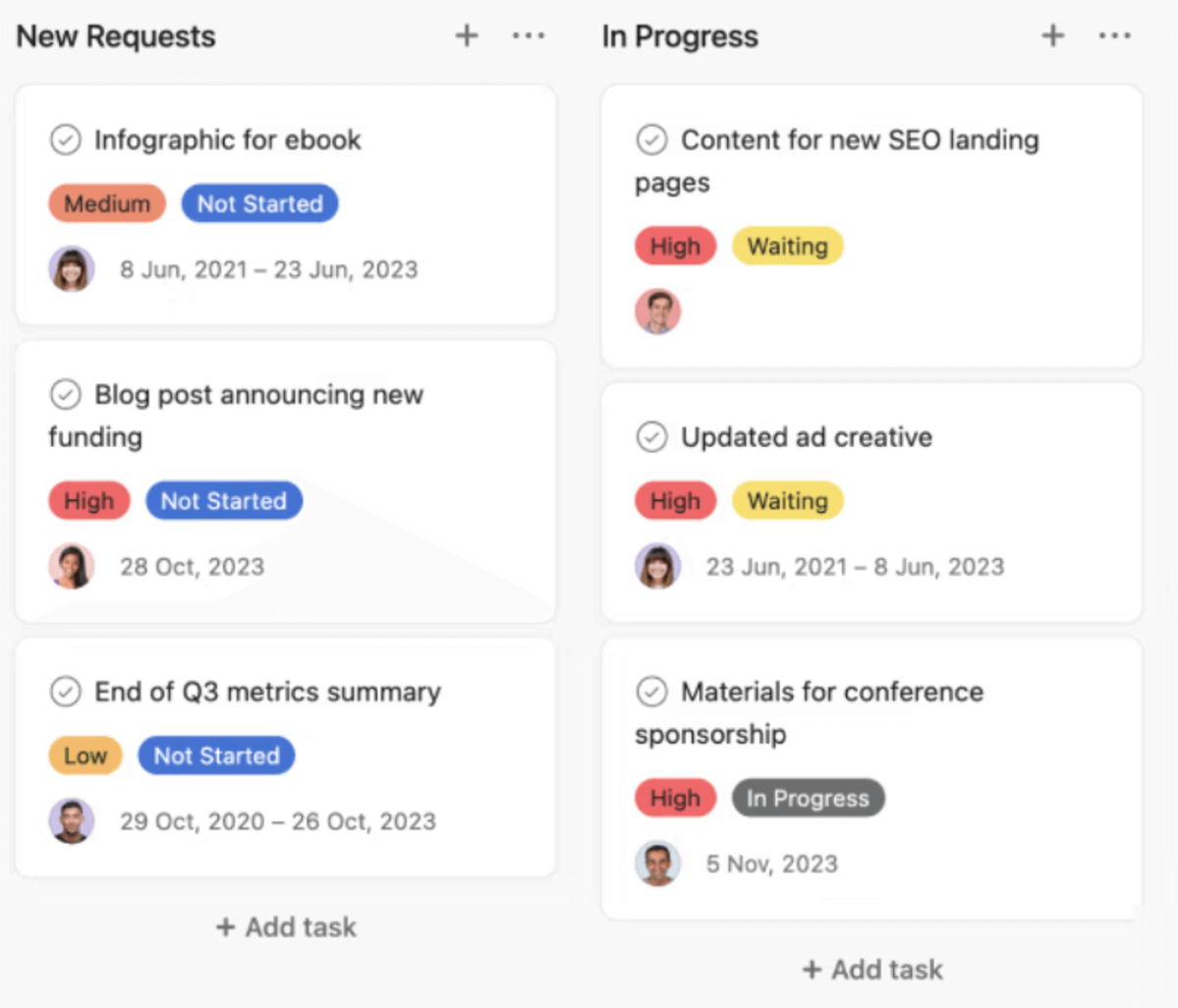
SOURCE: ASANA
Though Asana is certainly a stellar choice for business owners looking to manage their project status and automate routine tasks, professional service firms will find that some important features for managing complex processes are lacking. For example, meaningful insights into financial operations with project budgeting and profitability tracking.
10. Acumatica – A Fair Professional Services System for Large Companies
Acumatica is an ERP platform that supports financial visibility and project accounting for the professional services sector. Acumatica helps optimize employee schedules, coordinate service operations, and cooperate in real time.
Key Features:
- Flexible and customizable platform to adapt to unique workflows
- Project budgeting and expense tracking
- CRM and client management
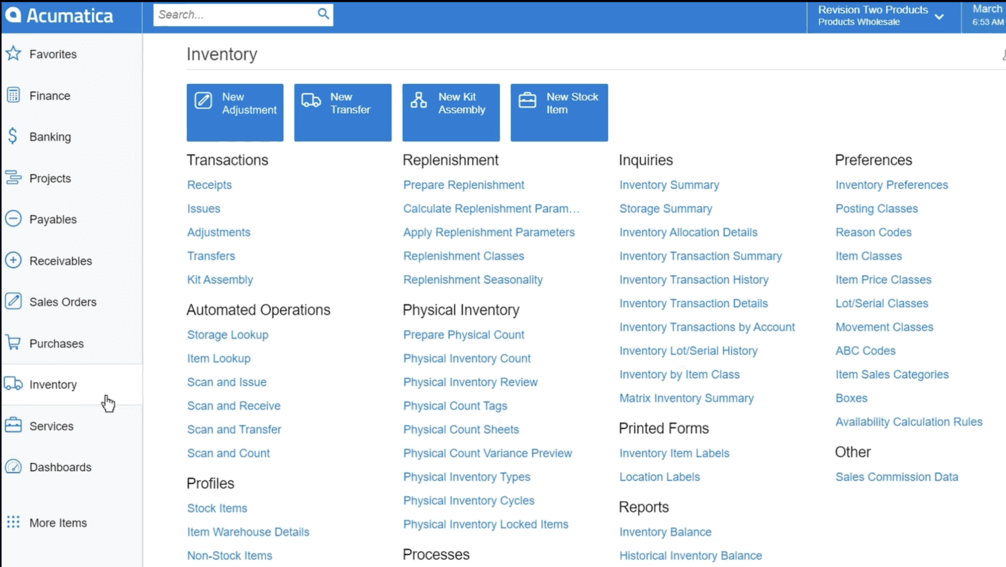
SOURCE: ACUMATICA
Reviewers have mentioned that while the platform is very customizable, the process is quite complex and can end up increasing costs. Other reviews have also mentioned that the basic reporting feature is lacking and requires further investment to sufficiently customize. This can ultimately make the tool inaccessible to emerging companies in the professional services industry.
11. Epicor – A Modular ERP for Consulting Firms
Epicor is an enterprise resource planning solution that caters to professional services providers in the consulting, education, upgrades, migration, and security services fields. Epicor offers multiple platforms and modules, depending on your business needs.
Key Features:
- Robust financial management with revenue forecasting
- Service performance insights with resource utilization and project planning
- Time and expense tracking
- Business intelligence and reporting
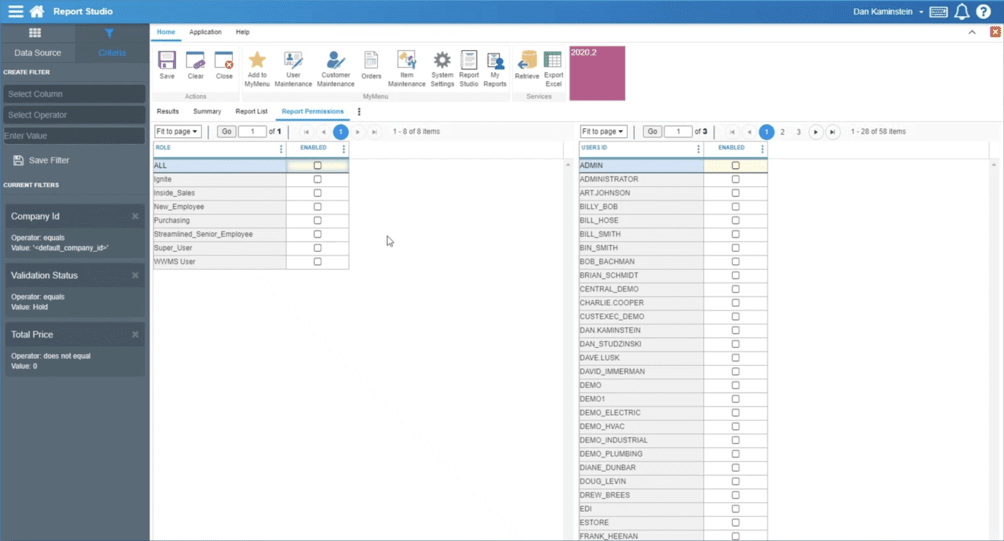
SOURCE: EPICOR
Epicor is an extremely versatile professional services solution suite. No matter which industry you’re in, there’s surely a module that will be of use to you. However, identifying which one might prove challenging. Finding and implementing all the different modules you need to fully support your business optimization might incur higher costs than investing in an all-in-one solution outright.
12. Ramco – A Software Solution for Service Companies with Accurate Accounting
Ramco is a software provider with a suite of solutions tailored to professional services firms, aimed mainly at enterprise-level clients. Ramco ERP includes products for financial management, project management, human capital management, and customer relationship management.
Key Features:
- Integrated project planning and execution
- Resource allocation and capacity planning
- Time and expense tracking
- Real-time analytics and dashboards
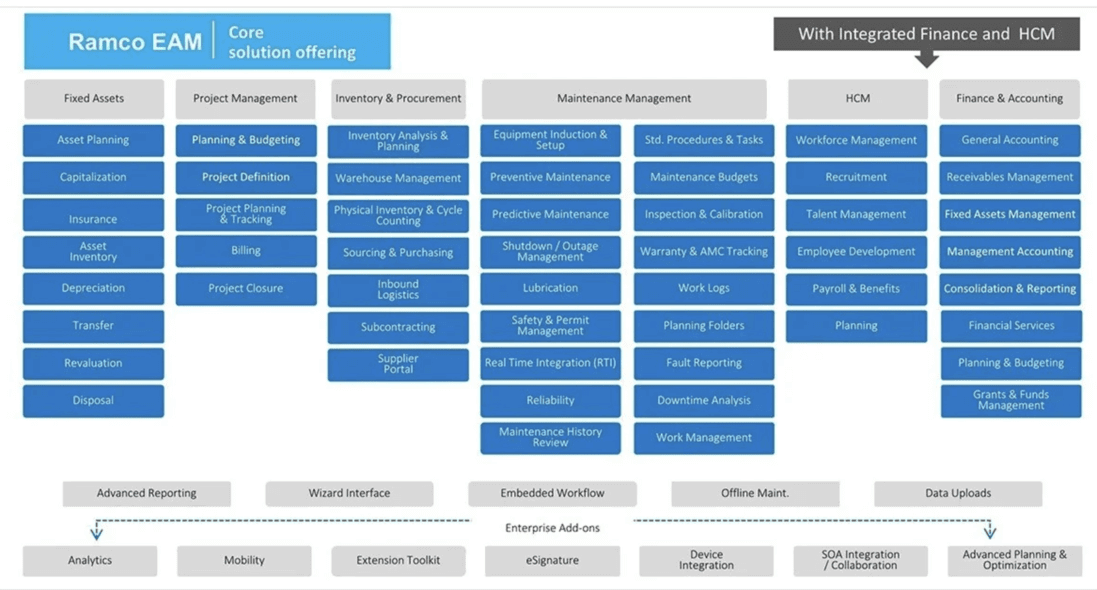
SOURCE: RAMCO
Reviews for Ramco ERP often mention that the implementation times can get lengthy and that the experience could overall be better. Additionally, Gartner reviews state that the user community is relatively small, which makes implementation more dependent on vendor support than tools with more active communities.
13. Striven – A Good Software Option for Service Performance
Striven is comprehensive business management software that supports service businesses by tracking human resources, financial performance, and real-time project timelines. Users praise Striven for its versatility and good customer support.
Key Features:
- Financial management and project accounting
- Project planning and resource management
- Customer relationship management for sales teams
- Time tracking and billing capabilities
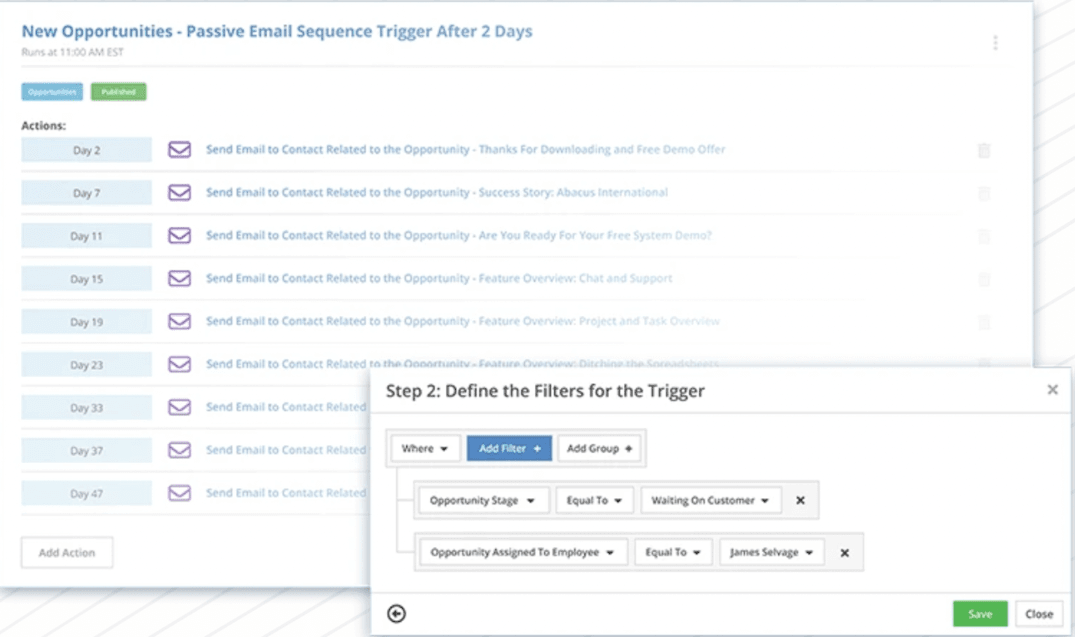
SOURCE: STRIVEN
While users are generally satisfied with Striven’s solutions for business service companies, some reported difficulties with the implementation and onboarding due to an abundance of choices. Additionally, Striven’s pricing models are somewhat restrictive and comparatively higher than similar tools on the market, which limits implementation options.
14. Workday – A Complex ERP Software Solution for Business Management
Workday is a vendor of ERP software for professional services firms. From management to billing, Workday applications support real-time insights and help services businesses optimize their operational costs.
Key Features:
- Time tracking and human capital management
- Cash flow management and revenue recognition
- Integration with third-party systems
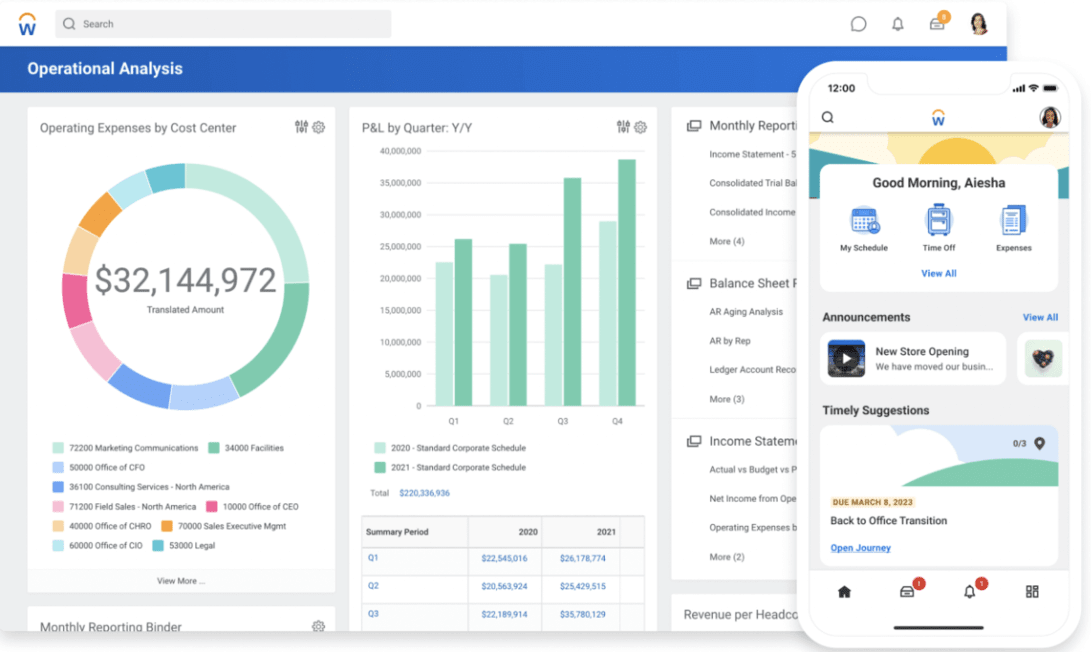
SOURCE: WORKDAY
Overall, users enjoy Workday as a tool to streamline their business operations. As the main downside, multiple reviews mention the Workday platform is complex, with a steep learning curve to onboard new users. Some also mention that the interface could be more user-friendly and that the pricing is steeper than comparable tools.
15. ERPNext – A Good ERP for IT Services Companies
ERPNext is an open-source professional services ERP software solution that offers modules for finance departments, project management, and customer relationship management.
Key Features:
- Open-source platform with community support
- Project planning and task management
- Time tracking and resource allocation
- Financial reporting and invoicing
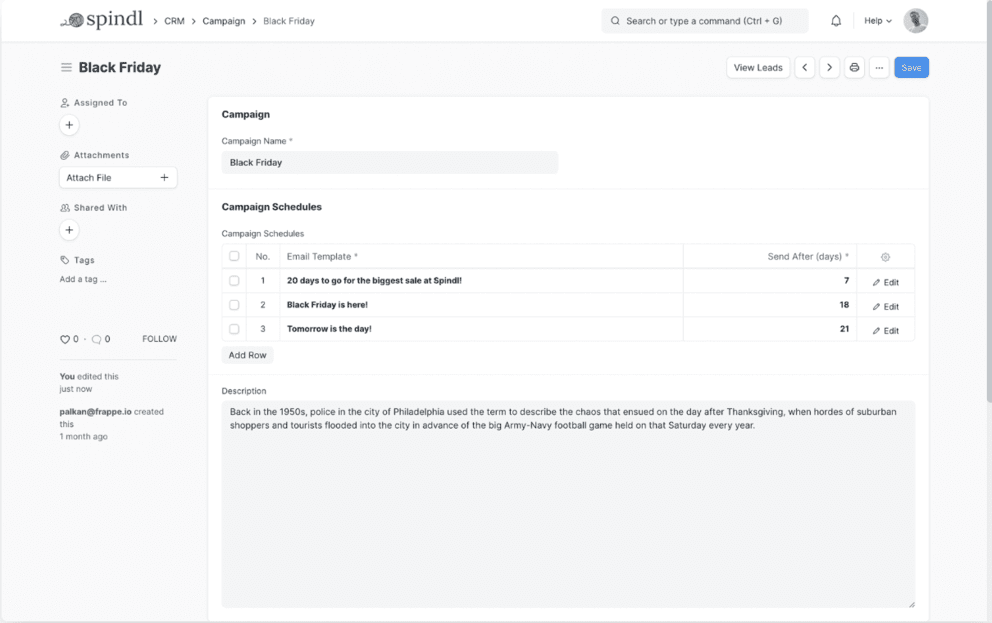
SOURCE: ERPNEXT
Reviewers often note that ERPNext’s open-source option helps them keep costs low. However, this comes at a price. Users note that the code needs to frequently be maintained so as to not break, especially when updates are being rolled out. In general, a tool like ERPNext will be inaccessible to teams that do not have a strong developer background or are unwilling to invest resources into extensive customization and maintenance.
16. Bitrix24 – A Free ERP for Marketing Agencies
Bitrix24 is a professional services ERP that provides support to marketing teams, sales teams, and legal teams, with project management, CRM, team collaboration, and communication features.
Key Features:
- Task and project planning with Gantt charts
- Time tracking and productivity reports
- Employee directory and workflow automation
- CRM integration
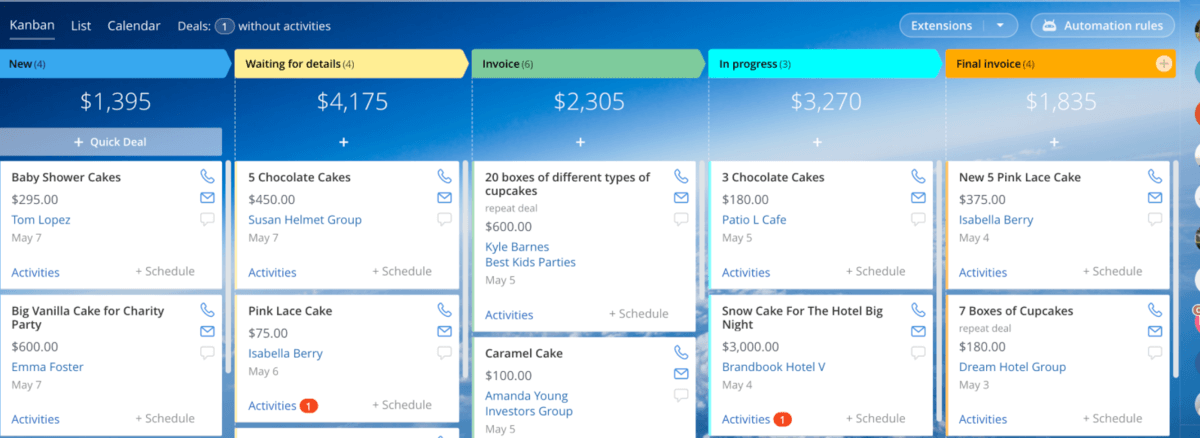
SOURCE: BITRIX24
Although Bitrix24 has a free version available, it’s quite limited when it comes to sales and marketing automation, CRM analytics, task customization, and others. The priced version, however, is relatively expensive when compared to some Bitrix24 alternatives. Users have pointed out that this makes the tool inaccessible to smaller businesses.
Takeaway: The Best ERP for Service Companies
Successful implementation of ERP software will depend mostly on your team’s willingness to adapt to new solutions. However, you can significantly increase your odds by making an informed decision on the software system you intend to implement.
The ultimate software for service companies should provide efficient cost management, accounting software, enhanced reporting capabilities, resource management tools, and customer relationship management, all in one. Additionally, it should be easy to use, with an approachable customer service team to help cut down your implementation costs.
Book a demo to find out more about Productive, the all-in-one ERP software that seamlessly supports your day-to-day business operations.
FAQ
What is ERP for professional services?
ERP, or enterprise resource planning, is the management of a company’s business operations, usually mediated by software. ERP for consulting and other professional services is a specific type of ERP that targets consultancies, accounting firms, law firms, marketing agencies, and other service-oriented businesses. Professional services ERP software includes features that support advanced project billing and precise revenue calculations, relationships with clients, customer interactions, project planning, and human resources management.
Can ERP be used in the service industry?
ERP provides real-time visibility into business operations and automates repetitive tasks so that project teams can spend less time on non-billable work. Additional features that ERP can provide to professional services firms are service delivery, resource management tools, revenue recognition, profitability analysis, billing capabilities, and contact management. All of this can create significant benefits for business service companies by improving day-to-day operations and optimizing high-level decision-making.
What are the 3 common types of ERP?
There are three main types of ERP:
- On-premises ERP
- Cloud-based ERP
- Hybrid ERP
Nowadays, most ERP software is cloud-based, meaning that it’s remotely accessible on any device with an internet connection. This is due to the multiple advantages of cloud-based solutions: flexibility, cost-effectiveness, accessibility, and faster implementation. However, on-premises or hybrid solutions might still be used for businesses with strict data compliance regulations or specific security concerns.
What are ERP examples?
ERP solutions serve to optimize business processes across a wide range of industries, including the financial services industry, or the professional services sector as a whole. Some common types of ERP solutions are Customer Relationship Management (CRM), Human Capital Management (HCM), Financial Accounting and Reporting (FAR), Manufacturing Execution Systems (MES), Supply Chain Management (SCM), and Project Management.
Among the numerous types of ERPs on the market, some standouts are:
- Oracle NetSuite
- Microsoft Dynamics 365
- SAP Business One
- Sage Intacct
- Productive
Is QuickBooks an ERP system?
ERP systems include modules that support a wide range of business processes for professional services firms and other industries, such as finance, supply chain, human resources, customer relationship management, project management, accounting, sales, and marketing. As Quickbooks primarily offers accounting functions that support financial health, it would not be considered a fully-fledged ERP system. However, QuickBooks can be used as an accounting solution to complement more robust ERP software systems.
Connect With Agency Peers
Access agency-related Slack channels, exchange business insights, and join in on members-only live sessions.

